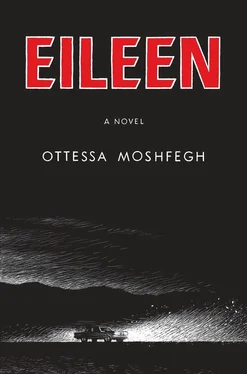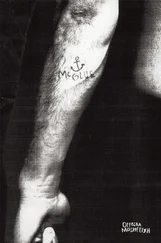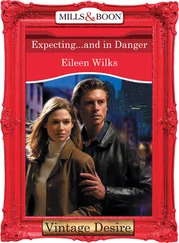“Are you hungry?” I asked him. “I could boil eggs.”
“I’m parched,” he said, words slurring, saliva popping between his lips. “No eggs. No rotten eggs.” I watched his foot shake beneath the thin blanket. “It’s cold,” he said. I sipped my tea and stared at his face, his drawn eyelids a curtain of wrinkled skin. He seemed to have no eyelashes, barely any color in his cheeks. “For Christ’s sake, Eileen.” He suddenly bolted upright, wrenched the oven door down, letting the heat blast out. “You’re trying to kill me. Think you’re so smart. This is my house.” He snatched his blanket back over his legs, tucked his feet in. “My house,” he said again, and curled up like a baby in a bassinet.
My father had been a police officer at the county precinct, one of just a handful of local cops who rarely had more to do than scare cats out of trees or drive drunk guys home from the VA hospital one town over. They were a tight bunch, the X-ville police. My father was always well respected, of course, dear to all who knew him on the beat, and his cold blue eyes and charming moralism earned him the nickname Father Dunlop. He never lost the cutting brininess of being a marine. He loved his police uniform. While he was on the force, he slept in it most nights, with his gun. He must have thought he was really something, prepared for the middle-of-the-night call to come and catch the bad guy. Such calls for heroism never came. I have to put it one way, so I’ll put it my way: He loved only himself and was full of pride and wore his badge like a gold star affixed to his chest by God himself. If he sounds trite, he was trite. He was very trite.
I didn’t think there was anything strange about my father’s drinking until my mother died. He’d been a run-of-the-mill beer drinker, I’d thought, whiskey just in the colder mornings. He’d gone with his friends on the police force to O’Hara’s regularly, nothing unusual. O’Hara’s was the town pub, which I’ll name after the poet whose work I always felt shut out of, even after I’d learned to read like a grown-up. Dad became persona non grata at O’Hara’s after he’d pulled his gun on the owner. Once my mother got sick—“fell ill” is an expression I like for its prissiness and, hence, its irony with respect to her violent demise — my father started taking time off work, drinking at home, wandering the streets at night, falling asleep on neighbors’ porches. And then he drank more — in the mornings, on the job. He totaled a squad car, and then fired his gun by accident in the locker room. Because he had seniority and was beloved by the whole department for reasons I’ll never understand, these indiscretions were never discussed openly. He was simply encouraged into an early retirement, replete with pension and constant surveillance and babying as the time went on and he got into more and more trouble. For some mysterious reason he switched to gin once my mother died. The most I can make of it is that perhaps gin reminded him of her perfume — she wore a stringent, flowery but bitter eau de toilette called Adelaide — and maybe imbibing the very fragrance of the dead was somehow soothing to him. But maybe not. I’ve heard a sip of gin will make you immune to mosquitoes and other pests. So perhaps he drank it with that logic in mind.
I spent the early afternoon shoveling snow. No boy ever did come asking if I’d pay him to do it for me. In the past I’d always gotten a little thrill when one of the neighborhood boys would ring the doorbell after a storm. They couldn’t have been more than twelve or thirteen years old, mittens and hats on, smelling like pine and candy canes. One boy in particular was just adorable. Pauly Daly, name sing-song and a face like an angel — big rosy cheeks and sapphire eyes. Whenever I saw him I wanted to embrace him, snuggle him in his thick wool coat. Pauly did a perfect job cleaning the snow off the car and out from under the tires, shoveled the drive well enough that I could open the driver’s side door, something I always forgot to do when I shoveled myself. It seemed so thoughtful. It proved, I imagined, that he really cared for me. One time I invited Pauly Daly inside while I looked for change to pay him. He shook off his boots before stepping into the front hall, removed his little hat. He was very well trained. Hair soft and tousled, I had to stop myself from putting my hands in it.
“Want a hot chocolate?” I asked him. I could tell he didn’t have the wherewithal to judge me as the odd, stiff and stone-faced girl everyone else saw me as, or so I thought. He sniffled and looked down at the dirty carpet, twisted one foot behind the other, then put his hat back on.
“No, thanks,” he said softly, blushing.
I kissed him on the cheek then. I meant nothing by it. He was a sweet boy and I liked him. But then he blushed and wiped away the clear mucus glistening between his nose and top lip. He looked utterly dismayed. I skidded away and dug through the pockets of coats hanging in the front closet. “Sorry,” I said after an awkward silence. I dumped all the change I could find into his cupped hands.
He nodded, called me “Mrs. Dunlop,” left, and never came around again.
When I’d finished clearing the snow off the car that Saturday, I rolled down the windows and let the Dodge run to warm up and defrost a bit. It was early afternoon by then and I wanted to drive over to Randy’s. I felt I had to. He lived in the upstairs of a split-level house not far from the interstate. I held tight to the magical notion that as long as I kept close tabs on him, he wouldn’t fall in love with anybody else. As far as I could tell, he spent most of his time alone in his apartment. But I rarely stalked him at night — I was afraid to — so who knows how many female visitors Randy entertained in the dark. From time to time a second motorcycle appeared next to his, parked in front of his snow-filled driveway. I guessed he had a best friend or brother who came to see him, and even that made me jealous. I generally parked across the street, huddled down behind the steering wheel, and watched his house in my side-view mirror. There was no real use in hiding, though. I doubt Randy would have recognized me if he’d found me camped out back there, surveilling him. I doubt he even knew my name. Still, I prayed for the perfect occasion to win him over. I spent hours sitting there scheming how I’d impress him with my feminine wiles. My daydreams of fingers and tongues and secret rendezvous in the back hallways of Moorehead kept my heart beating, or else I think I would have dropped dead from boredom. Thus, I lived in perpetual fantasy. And like all intelligent young women, I hid my shameful perversions under a facade of prudishness. Of course I did. It’s easy to tell the dirtiest minds — look for the cleanest fingernails. My father, for example, had no discretion about his pornographic magazines. They were behind the toilet, under the bed he’d shared with my mother, piled on shelves in the cellar, in a drawer in the den, in a box in the attic. And yet he was so staunchly Catholic. Of course he was. My own hypocrisies paled in comparison to my father’s. I’ve never had any guilt for what I did to him. I’ve been lucky in that regard.
Before I left for Randy’s that afternoon, I put on my mother’s old sunglasses — big, funny, petal-shaped lenses with tortoiseshell frames.
“Who do you think you’re fooling?” my father hollered, awake now and bent over the table, it seemed, to catch his breath. He wore the blanket over his back like a cape. “Going out with your pals? Happy happy?” He rolled his eyes, grabbed the back of the kitchen chair and rattled it. “Sit down, Eileen.”
“I’m late, Dad,” I lied, edging closer to the front door.
“Late for what?”
Читать дальше












